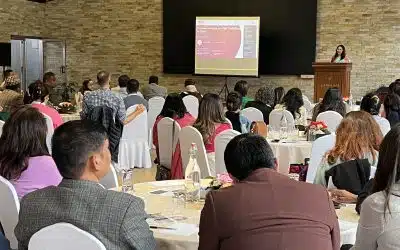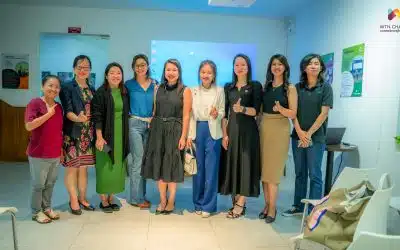InAsia
Insights and Analysis
Helping an Unlikely Entrepreneur to Keep Safe and Prosper
March 17, 2021
Marjina Begum runs a factory in Kurigram, a city in northern Bangladesh along the border with India. With 360 employees in the workplace, and another 200 based at home, she makes nakshi kantha, a type of ornately embroidered, quilted clothing that is a centuries-old tradition in Bangladesh and the Indian states of West Bengal, Tripura, and Assam.
Marjina is in some ways an unlikely entrepreneur. She grew up in the remote village of Tobotpur, the oldest of three siblings. As the oldest, and a daughter, her duties at home, helping her mother with housework and childcare and working with her father in the fields, cut short her education. She married at 13 and had her first child two years later.

Marjina Begum had a vision of something larger for herself and the women in her small village. (Photo: The Asia Foundation)
Her success is all the more improbable because of the conservative culture in which she was born and raised, which typically considers housework and children to be a woman’s lot, not business. Both women and men have strict expectations about women’s behavior, social norms that forbid interactions with men outside the family, making it hard to meet with buyers and suppliers, conduct normal business activities, or gain access to markets, information, or new technology.
Even as employees, women in Marjina’s world face gender-specific hurdles large and small: among them, job insecurity, because employers expect household obligations to pull them away, and workplaces that lack childcare facilities or even women’s restrooms.
But as the young Marjina contemplated her narrow world, she had a vision of something larger for herself and the women around her in her village. With just five original employees, working from home, she launched her business, Tobokpur Mohila Unnayan Shangshta, the Tobokpur Women’s Development Society, in 1996.

A woman sews traditional nakshi kantha at Marjina’s factory. (Photo: The Asia Foundation)
A quarter-century later, her business had grown, but it faced serious challenges. Based in a rural village, she had trouble connecting with buyers, and could only sell her products in local markets. Because her sales were poor, she had to pay her employees poorly. When she couldn’t provide a decent workplace, the women would drop out.
Then Marjina got help from WEESMS.
Women’s Economic Empowerment through Strengthening Market Systems, or WEESMS, is a five-year partnership between social-entrepreneurial consultants iDE and The Asia Foundation, funded by the Embassy of Sweden, that provides growth-oriented business-development services to female entrepreneurs and employees.

Majina Begum holds a Covid-19 safe workplace awareness meeting with her employees. (Photo: The Asia Foundation)
WEESMS takes a holistic approach to the many obstacles confronting small businesswomen in Bangladesh. The project links women entrepreneurs to some of the country’s best-known online marketplaces to help them find their way to new markets and increase their sales. It connects them with the financial services they need to operate and expand their businesses. It also leads national, regional, and community initiatives to encourage social change and improved public policy.
WEESMS helped Marjina reach out to new buyers who were interested in placing larger orders, and it introduced her to local government agencies that could help her promote her products to new markets.
Covid-19
When the pandemic reached Bangladesh, Marjina participated in a series of meetings organized by WEESMS that helped owners of small and medium enterprises (SMEs) like Marjina connect with suppliers of personal protective equipment and other pandemic-related hygiene products, and arranged presentations by suppliers on the correct use of this equipment and its importance for workplace health and safety.
Using workplace guidelines recommended by WEESMS, such as mask mandates, regular handwashing, and rearranging factory equipment to achieve social distancing, Marjina has kept her factory Covid-free and functioning despite the pandemic.

During the pandemic, Marjina distributed the WEESMS domestic violence pocket guide to the women in her factory. (Photo: The Asia Foundation)
The WEESMS project also provided Marjina with important information about the rise of domestic violence during the pandemic. She was able to share information with her female workers about domestic violence helplines and other services, and she distributed 65 copies of the WEESMS pocket guide on domestic violence to her employees. She also screened two video documentaries for her workers concerning “pot songs”—traditional Bangla protest songs—about domestic violence and men’s responsibility to help with the household chores, and she shared her own safe-workplace training with her workers.
Marjina Begum’s success and her effective safety initiatives have attracted the attention of local officials and several locally influential journalists. She says she will continue to support her employees through the inevitable post-pandemic adjustments, and she encourages other SMEs to to do as she has done.
Sukla Dey is senior program manager in Bangladesh for The Asia Foundation’s Books for Asia program. She can be reached at [email protected]. The views and opinions expressed here are those of the author, not those of The Asia Foundation.
1 Comment
About our blog, InAsia
InAsia is posted and distributed every other Wednesday evening, Pacific Time. If you have any questions, please send an email to [email protected].
Contact
For questions about InAsia, or for our cross-post and re-use policy, please send an email to [email protected].The Asia Foundation
465 California St., 9th Floor
San Francisco, CA 94104
The Latest Across Asia
News
April 2, 2024
Program Snapshot
March 28, 2024
Program Snapshot
March 28, 2024
Program Snapshot
March 25, 2024

2024 Lotus Leadership Awards
Thursday, April 25, 2024, New York City
The Lotus Leadership Awards recognize contributions towards gender equality in Asia and the Pacific







Thank you Shkla di, nicely covered the success story of Marjina Begum. Marjina Begum can become the model of other SMEs and we can present her as a Champion to others.